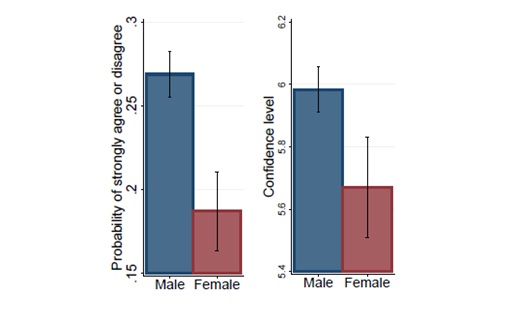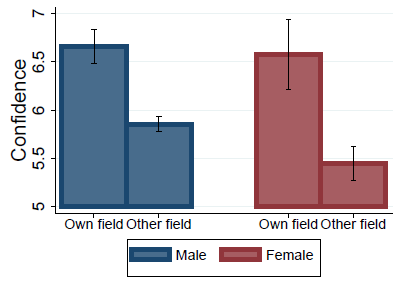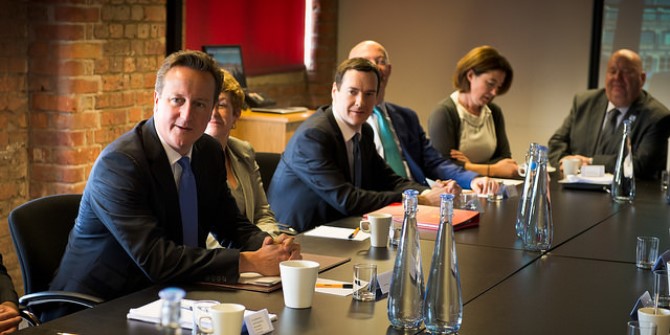
 In male-dominated workplaces, women tend to be less confident than men. Heather Sarsons and Guo Xu conducted research into confidence levels of successful economists and found that the gender gap is largely driven by women’s lack of confidence when asked questions on topics outside their field of expertise. Addressing the confidence gap may require further thought over what the “right” level of confidence should look like.
In male-dominated workplaces, women tend to be less confident than men. Heather Sarsons and Guo Xu conducted research into confidence levels of successful economists and found that the gender gap is largely driven by women’s lack of confidence when asked questions on topics outside their field of expertise. Addressing the confidence gap may require further thought over what the “right” level of confidence should look like.
We have made tremendous strides toward reaching gender equality. Women are entering the workforce in larger numbers than ever. They outnumber men in university enrollment. Yet women are still promoted at lower rates than men are. While efforts have been made to increase female representation in science and math, women tend to leave those subjects at higher rates than men at all points in their careers. This is particularly prominent in academia: in economics, for example, women have been earning approximately 1/3 of doctoral degrees since the early 2000s. In 2012, however, only 28% of assistance professors, 22% of associate professors, and 12% of full professors are female.
Of course, there are many explanations for a “leaky pipeline” in academia: the “baby penalty”, everyday sexism at the workplace, and old boy networks. Anecdotes for such gender barriers abound – but these are all external barriers, leaving a more fundamental question aside: what if women behave intrinsically differently in competitive work environments? Indeed, much research has pointed to the role that psychological factors play in explaining the persistence of the gender gap at the workplace. The role of confidence is central: in male-dominated workplaces, women tend to be less confident than men are.
Underconfidence can magnify initial disadvantages: women are more reluctant to ask for promotions, bargain over salary increases and are thus paid less than their male counterparts. They are less likely to speak up in meetings, or appear less confident when presenting research results– a huge disadvantage where first impressions at research seminars and conference talks matter. There is also a double standard: women who are confident are viewed as less likeable and overly assertive, while the same does not apply to men (boss vs. bossy etc.).
 Image credit: Wonder Woman & Superman by Cristian Borquez (Flickr, CC BY)
Image credit: Wonder Woman & Superman by Cristian Borquez (Flickr, CC BY)
In our research, we turn our focus to the end of the “career funnel”. Does a confidence gap exist between women and men who have made it to the tops of their professions? Given the existing research, one might expect that women who break the “glass ceiling” are necessarily confident and maybe even overconfident. At the same time, if women are penalized for being confident, a confidence gap may still persist.
We study a set of top academic economists holding full tenure positions at top U.S. universities. The top economists under study are drawn from the IGM survey, which collects expert assessments from these select academics on a series of economics and policy questions. Each economist in the survey is asked for their opinion on a wide range of issues. These range from questions on inequality (“The most powerful force pushing towards greater wealth inequality in the US since the 1970s is the gap between the after-tax return on capital and the economic growth rate.”) to Russian sanctions (“Past experience suggests that economic sanctions do little to deter the target countries from their course of action”). For each of these questions, the experts are asked to state their level of agreement on a scale of 1 (Strongly agree) to 5 (Strongly disagree). In addition, they are asked to provide their level of confidence they have in the accuracy of their answer (1 no confidence to 10 very confident).
We look at two types of confidence. As the first measure, we look at the propensity of the respondents to provide extreme answers on either end. Clearly, a respondent that consistently strongly agrees or disagrees to statements can be considered to have a greater level of confidence than someone who is more likely to pick a neutral assessment (“uncertain”). The second measure of confidence is their belief in the accuracy of their answer, as measured on a scale of 1 to 10. Using these two measures, we compare whether female academics – even at the very top of their career – are less confident than their counterparts. They are both less likely to hold “extreme” views and are less confident in their views.
We find that top female economists are, on average, less confident than their male counterparts (Figure 1). Women are less likely to strongly agree or disagree to a statement (left) and provide a confidence rating that is lower (right). This confidence gap is not driven by observable differences such as the number of single authored and co-authored publications, the current employer, the PhD awarding body or choice of research field.

Even women who made it to the tops of their profession and are comparable to their male counterparts in terms of academic output appear to be less confident. Where is the gender difference coming from? When dissecting the data further, we find that the gender gap in confidence is largely driven by women being underconfident when asked questions on topics outside of their field of expertise: Remember that questions cover a wide range of issues – some of which may fall within an academic’s field of expertise, and some of which may not be directly related to an academic’s own research at all.
While academics are typically less confident about providing assessments on topics outside their field of expertise (Figure 2), women tend to be even less confident when moving beyond their own research area. For example, a woman and a man who both conduct research on labour markets are equally confident when asked questions on labour topics. However, when asked questions about the banking crisis, the woman states that she is less confident that her opinion is correct while the man’s confidence waivers by less.
Given the data, it is impossible for us to determine who holds the “right” amount of confidence. It is therefore hard to say whether men are overconfident or women underconfident. But our findings do suggest a more nuanced interpretation of a gender confidence gap: women being less confident may not always be a bad thing.
Note: This article was originally published on our sister site, the Impact of Social Science blog.
 Heather Sarsons is a PhD candidate at Harvard University. Her research focuses on topics related to gender and race inequality in the labour market. She can be found on Twitter @saskatchewin.
Heather Sarsons is a PhD candidate at Harvard University. Her research focuses on topics related to gender and race inequality in the labour market. She can be found on Twitter @saskatchewin.
 Guo Xu is a PhD candidate at the London School of Economics. His research focuses on the selection, recruitment and allocation of talent within private and public sector organizations. He can be found on Twitter @misologie.
Guo Xu is a PhD candidate at the London School of Economics. His research focuses on the selection, recruitment and allocation of talent within private and public sector organizations. He can be found on Twitter @misologie.









What can you say about the gender difference in general knowledge, time spent reading different literatures from the respondent’s own research field and just generally time spent watching and reading the news? This could all feed into the “confidence gap”. I agree with the fact that there may well be a confidence deficit among women, but then there is also the documented overconfidence of the opposite sex and the gender difference in honesty (which, fair enough, seems to arise more in groups than in individual decisions, but I wouldn’t be surprised if males’ relative comfort with the misrepresentation of the truth reinforced pre-existing patterns of overconfidence). Moreover, what is actually behind this lack of confidence you find: women’s belief that they are not capable of performing the task at hand? or some kind of deeply ingrained tendency for conformity or fear of social penalty, as in “what would people say if I was confident about something that turned out not to be true?” Your research is necessary and promising, so keep digging!
“[The gender gap is largely driven by women’s lack of confidence.” – this sounds a lot like blaming women for the gender gap. Women tend to be less arrogant and more honest. Think about it. Society tells women from day 1 that they are not to be trusted – there are so many cultural memes of women who manipulate and deceive. It makes sense that women would then tend to say what they know rather than speculate. It costs us a lot more to be wrong than it costs men.
Confidence gap or arrogance gap? Admitting what you may not now or allowing yourself to be open to input is a STRENGTH.
Confidence gap or honesty gap?